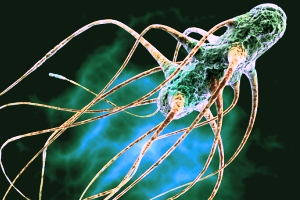RESEARCH: Antibiotic-resistant salmonella in Vietnamese pork

Vietnamese and Japanese researchers have investigated the spread of antibiotic-resistant salmonella isolates in retail pork and poultry meat from North Vietnamese markets.
A total of 118 Salmonella isolates were detected from 283 retail meat samples (135 pork and 148 chicken meat) purchased at retail markets in Northern Vietnam. Thirteen serovars, including Infantis, Anatum, Rissen, Reading, Emek, Typhimurium, Blockley, London, Newport, Derby, Weltevreden, Albany, and Hadar, were determined.
Resistance to tetracycline (54.2%), sulfonamides (52.5%), streptomycin (41.5%), trimethoprim (36.4%), chloramphenicol (35.6%), and ampicillin (33.1%) was commonly seen in the Salmonella isolates.
Fourteen [blaTEM, blaOXA-1, blaPSE-1, aadA1, sul1, tetA, tetB, tetG, cmlA1, floR, dfrA1, dfrA12, aac(3)-IV, and aphA1-1AB ] of 17 resistance genes were detected from the isolates demonstrating resistance.
Genes for plasmid-mediated quinolone resistance, such as qnrA, qnrB, qnrS, qepA, and acc(6′)-1b-cr, were not detected in 23 quinoloneresistant isolates. The substitution TCC to TTC at codon 83 of gyrA was found in the 18 quinolone-resistant isolates.
The data revealed that resistant Salmonella strains were widely distributed in Northern Vietnam via the food chain and that they might contain multiple genes specifying identical resistance phenotypes.
Source: Journal of Food Protection











